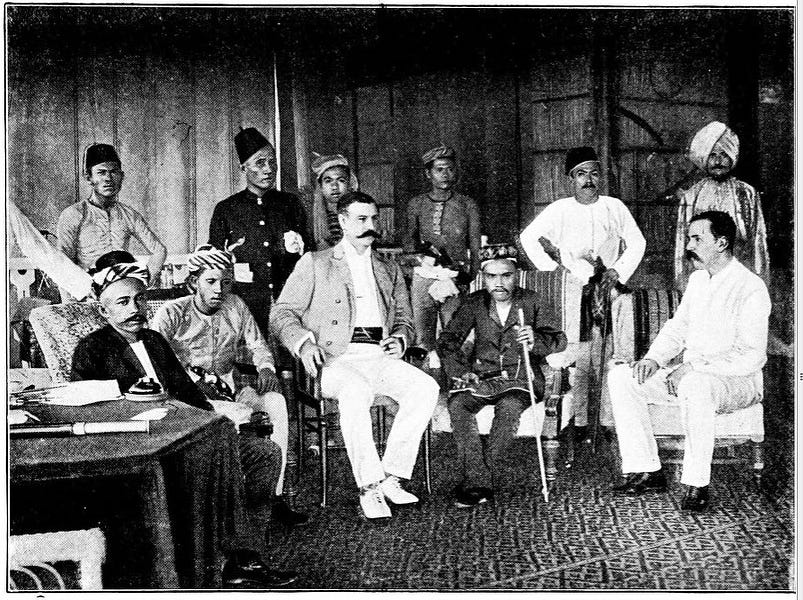The recent decision by a French court to award the supposed heirs of the Sultan of Sulu a ludicrous sum of money in an arcane case stemming from long-disappeared colonial entities might well be considered a new form of neo-colonialism, or perhaps just a way of making national courts of law look ridiculous by entertaining preposterous claims.
Others might consider it attempted extortion. It is also a potential threat to peace in Southeast Asia, where countries have long almost entirely accepted the borders bequeathed by western imperialism. In particular, it might encourage the Philippines to revive its own claim which derives from that of the Sulu sultan.
The situation would seem comic if the court hadn’t awarded such a gigantic sum – US$14.8 billion against the Malaysian state oil company Petronas – in respect of its earnings from gas deposits off Sabah, the Malaysian state once partly owned by the Sulu sultan. In response to the decision, by the French commercial arbitration court, a bailiff in Luxembourg made an asset seizure order on two Luxembourg-based subsidiaries of Petronas.
In the process, the court appears to have undermined the whole method of international arbitration, by which courts of signatory countries automatically respond to arbitration awards made elsewhere. The so-called heirs had originally brought their case in Spain but there the court had rejected it as being a diplomatic matter beyond the scope of the arbitration process which is supposed to apply only to commercial disputes.
That fact explains why the alleged heirs went after Petronas rather than the Malaysian government. Now that the French court has given its bizarre ruling, Petronas can expect other asset seizure orders.
The basic fact is that some courts in Europe are giving credence to a claim which seeks to extort billions of dollars from Petronas on account of its earnings from gas fields off Sabah. Although done in the name of the heirs of the Sultan of Sulu it is actually being financed by a UK-based investment fund which has enabled it to hire some of the most expensive lawyers in London, Spain, and France to convince the courts of the old imperial powers that they still rule the world as surely now as in 1878.
The case involves two traders, one German, Baron von Overbeck, and one a British merchant, Alfred Dent, who did deals with the sultans of Brunei and Sulu, the latter in exchange for an annual payment of US$5,000, to acquire the land now known as Sabah. At the time neither sultan appeared to exercise control of the area. The sultan of Sulu’s part had previously been a part of Brunei but the Sulu influence was confined to the coast.
In 1881, the Hong Kong-based Dent set up the British North Borneo Company to administer and develop the territory. Although officially the British kept clear, the sultan agreed that they had pre-emptive rights to prevent another country from acquiring it. It came under British Protection in 1888 and was not officially ruled by London until 1946. Spain once had a nominal claim to the area via the Sultan of Sulu but in an 1885 agreement with Britain and Germany Spain renounced any claims on Borneo.
By that time anyway, the Sultan of Sulu had in 1878, after centuries of resistance, accepted Spanish sovereignty over his little archipelagic empire, till then the slave-raiding and trading center of the region and where the Tausug elite lorded over other ethnic groups.
In turn, that acknowledgment of sovereignty by Sulu passed to the United States in the 1898 treaty after the Spanish-American war and was accepted by the sultan. The treaty made no mention of Sabah. In 1915 the sultan gave up all political power in his former sultanate as part of American reorganization of government throughout the Philippines. Subsequently, there were disagreements as to the rightful heir, but the annual sum continued to be paid to known descendants.
As for the Philippines, self-governing from 1935 till the Japanese invasion, and fully independent in 1946, its claim to Sabah, launched by President Macapagal, did not arise till 1962 when the departing British joined Sabah and Sarawak to the already independent Malaya to form Malaysia. Apart from a botched plan by then-President Ferdinand Marcos in 1968, the issue has not been seriously pursued – though remaining an irritant to regional harmony. It anyway is a nonsense not only from a historical point of view. The Sulu archipelago has seen almost constant conflict for the past more than 50 years, losing large number of its population to a stable and relatively prosperous Sabah.
The annual payments to individual heirs of the Sultan were made regularly by Malaysia to the Philippines-based heirs until they stopped after a bloody episode in 2014. A group from Sulu claiming to represent one claimant Sultan, Jamarul Kiram III, attempted an invasion of Sabah, landing a tiny force near the town of Lahad Datu. This bizarre event ended with the deaths of more than 60, mostly from Sulu but including 10 Malaysians.
The payments later resumed. But anyway these have little to do with the multi-billion dollar claim against Petronas which rests more on the argument that the Sultan merely leased the land rather than ceded it as in the English version of the agreement and was entitled to a share of oil and gas wealth even though the treaty contained no mention of any income due to the sultan other than the $5,000 or any right to royalties from natural resources – in the case of oil and gas not discovered till a century later.
If courts in Europe want to start trying to unpick 150 years of colonial and post-colonial treaties, the world will be in chaos. In addition to viewing Sulu as a former fiefdom, Brunei could claim back Sarawak, which was ceded in stages to the British adventurer James Brooke, and Labuan, ceded to the British, and maybe Manila itself, ruled by rajas with close links to Brunei until conquered by Spain in 1570.
Then there is the case of Singapore, in theory only leased to the British by the Sultan of Johore whose own position was in dispute.
The Sabah case is gaining notice in Europe, helped along by a long article in the Financial Times which was long on criticism of the Malaysian government while deficient in historical background. For sure, Malaysia, preoccupied with domestic political wrangling, has mishandled the issue. But European courts are suckers for those who claim to be fighting to redress colonial wrongs when they are actually stirring up political trouble for ex-colonial nations. These are clearly motivated by the greed of a few rather than the interests of the million people of Sabah.
The latter may have good cause to resent how much of their gas wealth goes into federal coffers rather than raise living standards in the state, the poorest in Malaysia. But that is a very different matter than surrendering assets to undeserving former royals and the lawyers and investors making a mockery of the arbitration system, doubtless hopeful for a payoff by agreeing a “settlement” in return for ending their nuisance litigation.
Philip Bowring, a co-founder and consultant editor to Asia Sentinel, is an authority on the history of Southeast Asia and the author of Empire of the Winds: The Global Role of Asia’s Great Archipelago.





















Discussion about this post